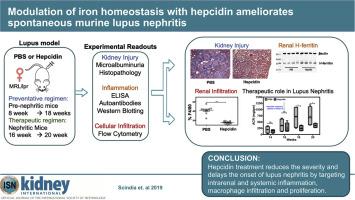Kidney International ( IF 14.8 ) Pub Date : 2020-02-17 , DOI: 10.1016/j.kint.2020.01.025 Yogesh Scindia 1 , Ewa Wlazlo 1 , Elizabeth Ghias 1 , Sylvia Cechova 1 , Valentina Loi 1 , Joseph Leeds 1 , Jonathan Ledesma 1 , Cathro Helen 2 , Sundararaman Swaminathan 1

|
Lupus nephritis is the end organ manifestation of systemic lupus erythematosus. Iron metabolism and its master regulator, hepcidin, are known to regulate cell proliferation and inflammation, but their direct role in the pathophysiology of lupus nephritis remains under-investigated. Exogenous hepcidin reduced the severity of lupus nephritis in MRL/lpr mice, a preclinical model of spontaneous systemic lupus erythematosus without worsening anemia of inflammation. Hepcidin treatment reduced renal iron accumulation, systemic and intrarenal cytokines, and renal immune cell infiltration, independent of glomerular immune complex deposits and circulating autoantibodies. Hepcidin increased renal H-ferritin (a ferroxidase), reduced expression of free iron dependent DNA synthesis enzymes, Ribonucleotide Reductase 1 and 2, and intra-renal macrophage proliferation. These findings were recapitulated in vitro upon treatment of macrophages with hepcidin and murine colony stimulation factor-1. Furthermore, hepcidin-treated macrophages secreted less IL-1β and IL-6 upon stimulation with the TLR3 agonist polyinosine-polycytidylic acid. Of clinical relevance, hepcidin reduced progression and severity of nephritis in old mice with established systemic autoimmunity and overt proteinuria, highlighting its therapeutic potential. Thus, our findings provide a proof-of-concept that targeting cellular iron metabolism with hepcidin represents a promising therapeutic strategy in lupus nephritis.
中文翻译:

用铁调素调节铁稳态可改善自发性鼠狼疮肾炎。
狼疮性肾炎是系统性红斑狼疮的终末器官表现。铁代谢及其主要调节剂铁调素可调节细胞增殖和炎症,但它们在狼疮性肾炎的病理生理中的直接作用仍未得到充分研究。外源性铁调素可降低MRL / lpr小鼠的狼疮性肾炎的严重程度,这是自发性系统性红斑狼疮的临床前模型,不会加剧炎症性贫血。Hepcidin治疗可减少肾铁积累,全身和肾内细胞因子以及肾脏免疫细胞浸润,而不受肾小球免疫复合物沉积物和循环自身抗体的影响。Hepcidin可增加肾脏H-铁蛋白(一种铁过氧化物酶),减少自由铁依赖性DNA合成酶,核糖核苷酸还原酶1和2的表达 和肾内巨噬细胞增殖。总结了这些发现在体外用铁调素和鼠集落刺激因子-1治疗巨噬细胞。此外,用TLP3激动剂聚肌苷-聚胞苷酸刺激后,用铁调素处理的巨噬细胞分泌较少的IL-1β和IL-6。具有临床相关性,铁调素降低了已建立的系统自身免疫和明显蛋白尿的老年小鼠肾炎的进展和严重程度,突出了其治疗潜力。因此,我们的发现提供了一个概念证明,即用铁调素靶向细胞铁代谢代表了狼疮性肾炎的一种有前途的治疗策略。











































 京公网安备 11010802027423号
京公网安备 11010802027423号